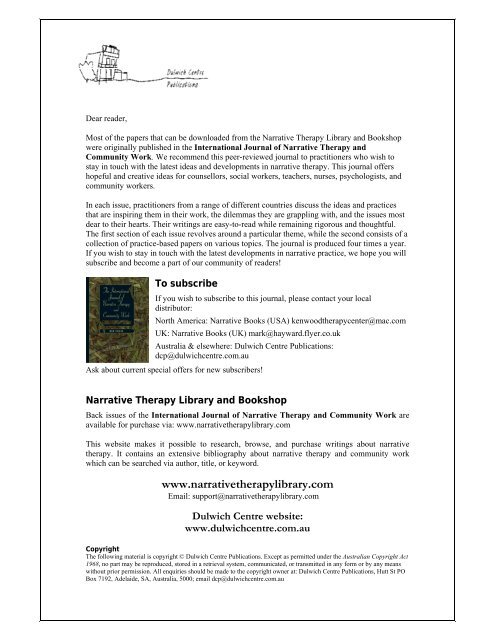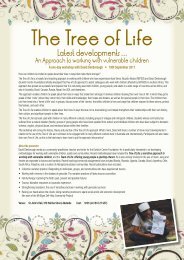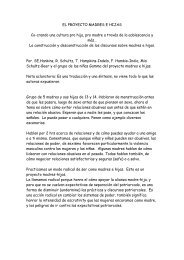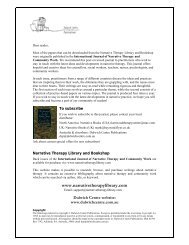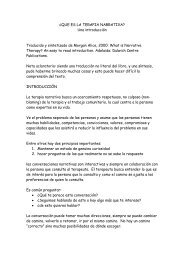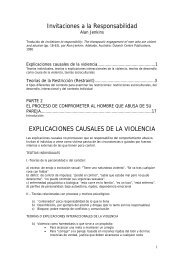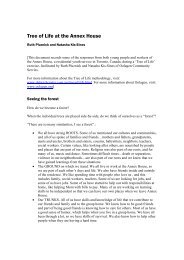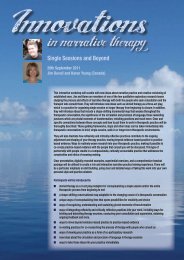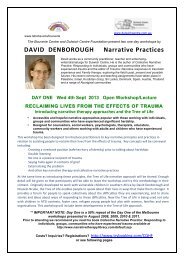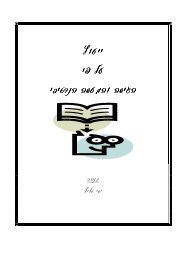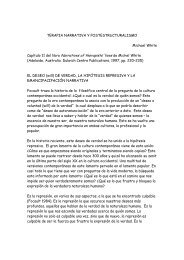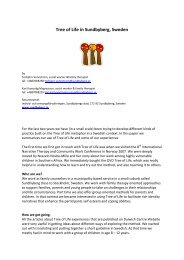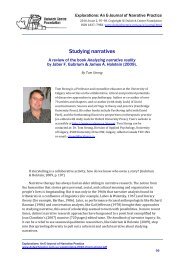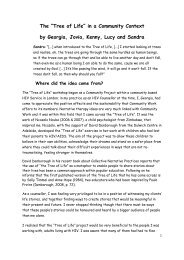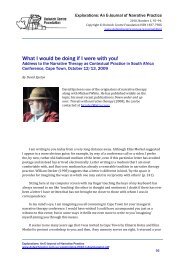Decentring research practice - Dulwich Centre
Decentring research practice - Dulwich Centre
Decentring research practice - Dulwich Centre
Create successful ePaper yourself
Turn your PDF publications into a flip-book with our unique Google optimized e-Paper software.
<strong>Decentring</strong> <strong>research</strong> <strong>practice</strong>byAndrew Tootell 1This article presents a brief account of one therapist’s journey to develop a <strong>research</strong>approach that was consistent with their values and <strong>practice</strong> as a therapist. This journeyled to the development of a ‘De-centred <strong>research</strong> <strong>practice</strong>’ based upon an ethic ofcollaboration and equity, which seeks to document the ‘local’ skills and knowledge ofthe <strong>research</strong> participants.Keywords: <strong>research</strong>, therapy, de-centred <strong>practice</strong>IntroductionFour years ago I took the step into the land of postgraduate<strong>research</strong> and enrolled in a Masters of Clinical Science(Psychotherapy) in Adelaide University’s PsychiatryDepartment. From the beginning I was determined to find (orinvent if necessary) a <strong>research</strong> approach that was consistentwith my values and <strong>practice</strong> as a therapist. It was the ‘Ethic ofcollaboration and decentred <strong>practice</strong>’ (White 1997) which actedas a set of guiding principles for me, towards developing a<strong>research</strong> <strong>practice</strong> that was in alignment with my approach totherapy. The core of these <strong>practice</strong>s for me was that it was theexperience, awareness, knowledge, values and skills of theperson(s) who consulted me that were at the centre of my workas a therapist. My job as therapist as I saw it, was to help personsaccess and connect with these preferred aspects of their life andrelationships. I use my own experience, awareness, knowledgeand skills to assist persons with this therapeutic process.This article presents a brief account of my journey tomake this goal a reality. It tells the story of how I invented a<strong>research</strong> design to explore the experience of persons in theirrespective roles as clients and therapists of participating in areflecting team process, and discusses some of theimplications of this <strong>research</strong>.The <strong>research</strong> settingAt the time I began the <strong>research</strong> I worked in a Child &Adolescent Mental Health Agency. The agency happened tohave a team of very experienced therapists who met togetherone morning per week to work as a reflecting team. It was aclosed team and they had worked together for over ten yearsand had developed a high level of trust and a goodunderstanding of working together as a team.My <strong>research</strong> question was simple: ‘How do persons intheir respective roles as clients and therapists experience theirThe International Journal of Narrative Therapy and Community Work54 2004 No.3 www.dulwichcentre.com.au
participation in a reflecting team process?’ All team membersagreed to participate in the <strong>research</strong>. The families whoparticipated in the <strong>research</strong> were selected using opportunisticsampling; that is, I invited each therapist to nominate a familywho I could contact to participate in the <strong>research</strong>. Havingfound my <strong>research</strong> site, and clarified my <strong>research</strong> question,the next step was to review the literature.Review of relevant literatureMy review of the literature included both <strong>research</strong>studies into individual counselling and psychotherapy as wellas specific <strong>research</strong> and literature on family therapy andreflecting teams.My reading became a search to find methodologiesthat were congruent with my values and <strong>practice</strong> as atherapist, and that would enable me to <strong>research</strong> the experienceof the participants. These two interests led me into the area of‘qualitative process <strong>research</strong>’, of which there are four mainapproaches (Macleod 1999, p.33):• Textual analyses of therapy transcripts;• Post-session or post-termination interviews with personsin their respective roles as clients and/or therapists;• Post-session or post-termination open-endedquestionnaires; and• Interpersonal Process Recall (Elliot 1986), which involvesthe <strong>research</strong>er playing back a full audio or videotaperecording of a session (or excerpt from a session) to theparticipants (clients and therapists) and then interviewingthe participants about the session. The interview will oftenfocus on participant’s experience of aspects of thetherapeutic interaction which they found helpful orhindering. This is later transcribed and analysed.I finally decided to adapt the post-session interviewmethod because this allowed a greater focus on theparticipants’ experience of the overall course of the therapyand helped to keep the <strong>research</strong> conversation separate fromthe therapy conversation.Following my literature review I identified five linesof inquiry:• Experience of the participants before meeting each otherfor therapy. What were their expectations orpreconceptions?• Their experience of the first session.• Their experience of self (personal and/or professional).• Their experience of therapeutic relationship.• Their experience of therapeutic <strong>practice</strong>s and theiroutcomes.These domains of experience have been consistentlyreferred to and identified as important in shaping person’sexperience of therapy (Elliot & James 1989; McLeod 1990;Rennie 1992). I then wrote a semi-structured interview guidealong these five lines of inquiry and included a number ofsuggested questions under each domain. I remained open toexploring the full range of experience identified byparticipants as significant. However, I did have a specialinterest in understanding what participants found uniquelyhelpful about their experience of meeting in the context of areflecting team process and participating in this kind of<strong>research</strong> project.The <strong>research</strong> interviews went ahead and the interviewswere transcribed, generating what I thought was data worthyof reflection and documentation. However, it was at this pointthat I started to hit some barriers instituted by dominant ideasof how <strong>research</strong> is to be structured. In all the literature I hadread, it had been the principle <strong>research</strong>er(s) rather than the<strong>research</strong> subjects that had done the ‘analysis’ part of the<strong>research</strong>. However, this dominant <strong>practice</strong> did not fit with myaim of designing <strong>research</strong> that was more collaborative, notonly at the data gathering end but also at the analysis end ofthe <strong>research</strong> journey. This had also been noted by other<strong>research</strong>ers in different fields:In traditional scientific enterprises the theoreticalmeaning of events is almost wholly controlled by theprinciple investigator. Subjects serve as reactivepawns for manipulation, control or observation. Theyare not encouraged to reflect on their situations withinthe study, nor to offer their interpretations of events.They are simply used as vehicles to enhance the powerof the investigators voice. This voice remainseffectively closed. By taking a reflexively dialogicalapproach to <strong>research</strong>, a new form of scientific workcan be developed ... The foremost feature of this typeof work is the sharing of power between <strong>research</strong>ersand subjects in order to construct meaning. ‘Subjects’become ‘participants’, and the number ofinterpretations (or theoretical possibilities) generatedby the <strong>research</strong> is expanded rather than frozen.(Gergen & Gergen 1991, p.86)The International Journal of Narrative Therapy and Community Work2004 No.3 www.dulwichcentre.com.au 55
Fortunately, I was already familiar with the notions oftherapy being a form of ‘primary’ <strong>research</strong> involving closecollaboration with the client from White (1997), Bird (2000)and Law (2000). I was also familiar from my training innarrative therapy with the idea of ‘Training as Co-Research’(White 1997, pp.172-190). This led me to think more abouthow the <strong>practice</strong>s I had learned in my narrative therapytraining could help me in designing my <strong>research</strong> method.Narrative therapy <strong>practice</strong>s and <strong>research</strong>When I started to think how I could apply these narrativetherapy <strong>practice</strong>s to <strong>research</strong> purposes I began to think of how todesign a <strong>research</strong> process where the role of the principle<strong>research</strong>er was decentred from that of someone who ‘collectedand analysed the data’ to that of someone who facilitated aprocess which allowed for the <strong>research</strong> participants to articulatetheir own experience, knowledge, values and skills.This orientation to <strong>practice</strong> is for me one of thedistinguishing trademarks of narrative therapy. What is more,the <strong>practice</strong> of interviewing persons who consult therapistsabout their experience of therapy had already been identifiedin the literature:It is also a common narrative <strong>practice</strong> for therapists toconsult persons about their experience of theseconversations after the event – persons are encouraged toreflect on their experience of particular meetings and onseries of meetings, and on the outcome of these meetings,by reviewing the subsequent developments in their lives.In this way, persons contribute to distinguishing the morehelpful conversations and relational <strong>practice</strong>s from theless helpful, and to a determination of those that were of ahindrance. It is in these consultations about therapeuticconversations and <strong>practice</strong>s that therapists’ expressions ofthis work are formed and reformed. It is in theseconsultations that therapists’ knowledges and skillsbecome more thickly described (White 1997, pp.139-140).In considering how narrative therapy <strong>practice</strong>s couldbe utilised in this <strong>research</strong> project, it became clearer that I didnot want to take an expert position as <strong>research</strong>er in which myanalysis of the data represented the ‘results’ of the <strong>research</strong>.Rather, I wanted the process of gathering the ‘data’ tocontribute to further rich description of the knowledge andskills of the participating therapists.A decentred approach to <strong>research</strong>In most qualitative <strong>research</strong> studies the <strong>research</strong> results orfindings are based upon the analytical skills of the <strong>research</strong>er(s).The pathway from data collection to data analysis to resultsneeds to be carefully validated according to criteria that havebecome acceptable to the community of experts employed inuniversities to carry out <strong>research</strong>. I decided to develop analternative approach to doing <strong>research</strong>. I named this a decentredapproach to <strong>research</strong> following the decentred approach to therapy<strong>practice</strong> as outlined by White (1997). A decentred <strong>research</strong>approach is based upon the ethic of collaboration and equity, andseeks to document the ‘local’ skills and knowledge of the<strong>research</strong> participants (co-<strong>research</strong>ers). In this approach to<strong>research</strong> it is the <strong>research</strong> participants rather than the principle<strong>research</strong>er that do the ‘analysis’.I saw my role as principle <strong>research</strong>er to involve thefollowing tasks:• To <strong>research</strong> the academic literature on the <strong>research</strong> topicin order to formulate lines of inquiry;• To interview the participants;• To transcribe the interviews and summarise theinterviews;• To document the reflections of the therapists on thetranscripts of the first interviews and to re-present these asthe ‘results’ section of the <strong>research</strong> in the form of a letterwritten to the participating therapists;• To discuss the implications of the findings for clinical and<strong>research</strong> <strong>practice</strong>.In this particular piece of <strong>research</strong>, it was the personsparticipating in their roles as therapists, who gave more oftheir time than the persons participating in their roles asclients. For example, I justified not inviting persons whoparticipated in their role as clients to a second interview onthe grounds that:• I didn’t want the <strong>research</strong> to intervene too radically intothe process of therapy; and• That the persons participating as therapists had aprofessional interest in reflecting on their work as areflecting team, whereas the persons who participated asclients had a personal interest in their own lives but notnecessarily the finer details of therapy and <strong>research</strong><strong>practice</strong>.The International Journal of Narrative Therapy and Community Work56 2004 No.3 www.dulwichcentre.com.au
This could be seen as unbalanced, but I felt thishonoured the different life worlds and interests of theparticipants.The problem of validityAccording to McLeod (1997), practitioner <strong>research</strong>ersinto therapy will always have trouble validating theirfindings. This becomes even more problematic when the<strong>research</strong>er wanders off the well-trodden path of traditionalqualitative methods. McLeod believes there are specialcriteria that are applicable to all practitioner <strong>research</strong>regardless of the specific methodology they have developedor chosen for their study:It has already been suggested that to be able to developknowledge that enriches <strong>practice</strong>, it is necessary to be asexplicit as possible about the organisational and personalcontext within which the <strong>research</strong> was carried out. Thisprinciple leads to the following criteria for practitioner<strong>research</strong>:• A good practitioner <strong>research</strong> study will providesufficient descriptive detail of clients, counsellors, thecounselling approach, setting, social and politicalcontext, etc., for readers to be able to make informedjudgements regarding the similarity and applicabilityof the study to their own <strong>practice</strong>;• A good practitioner <strong>research</strong> study will providesufficient information on the personal engagement ofthe <strong>research</strong>er(s) in the study, and their heuristicprocess, for the reader to be able to make a judgementconcerning authenticity, ‘ownership’ and personalintegrity. (McLeod 1999, p.18)While agreeing wholeheartedly with these sentiments,I also felt I needed to develop an alternative approach totraditional notions of validity.Decentred <strong>research</strong> <strong>practice</strong> and questionsof validityResearch methodology is usually premised on the needto eliminate subjective judgement, however, I argue that in adecentred <strong>research</strong> <strong>practice</strong>, subjectivity is not of concern if itis rendered visible, and does not in any way reduce thepossible pragmatic usefulness of the <strong>research</strong>. This decentered<strong>research</strong> makes no claim of ‘objective knowledge’ and‘realism’. Instead it involves an exploration and description ofparticularities of local knowledge which I felt to be morerelevant to practitioners. As the principle <strong>research</strong>er, I was notcentral to analysing the data 2 and therefore did not seek tocounteract my subjective prejudices by using a method suchas grounded theory. I did, however, seek to acknowledge andhighlight my subjectivity in a number of key ways such asusing writing as a method of reflexive inquiry and developing atwo-way account of <strong>research</strong>.Using writing as a method of reflexiveinquiryMost journal articles give a idealised picture of the<strong>research</strong> process in much the same way that presentations oftherapy stories are ‘glossed’ and ‘do not adequately representthe disorderly process of therapy’ (White 1993, p.22). This isoften encouraged by editorial requirements that ‘promote adistorted technical picture of scientific <strong>research</strong> as a logical,linear process – which is far from the continually changingactual <strong>research</strong> process with its surprises, design changes, andreformulations of concepts and hypotheses’ (Kvale 1996,p.83). I therefore wanted to write about my <strong>research</strong> in anexperience-near style to which narrative lends itself, ratherthan the experience-distant style of most paradigmatic<strong>research</strong> reports. I was committed to personalising and tellingthe story of my <strong>research</strong> journey as part of my methodologicalcommitment to decentred <strong>research</strong> and writing as a form ofdiscovery. Decentred <strong>research</strong>, as a form of reflexive<strong>research</strong>, is by definition inclusive of the self of the<strong>research</strong>er(s) in the final write-up of the <strong>research</strong> report(Steier 1991). The style in which I chose to write mydissertation therefore deliberately aimed to make mysubjectivity visible, unlike traditional academic writing whichaims to render the subjectivity of the <strong>research</strong>er invisible.A two-way account of <strong>research</strong>Traditional accounts of <strong>research</strong> are predominantlyone-way accounts in which the <strong>research</strong>er, through the use ofvarious ‘methods’, extracts knowledge from the <strong>research</strong>subjects. The <strong>research</strong> subject is constructed as the ‘other’The International Journal of Narrative Therapy and Community Work2004 No.3 www.dulwichcentre.com.au 57
that these methods act upon. Michael White (1997, p.130-132) describes a ‘two-way’ account of therapy, whereby thetherapist acknowledges the contribution the person who hasbeen consulting them has made to the development of theirskills and knowledge. In the same way, I thought a two-wayaccount of <strong>research</strong> would discuss the effect on the<strong>research</strong>er(s) of entering into a <strong>research</strong> relationship.Research subjects in two-way accounts of <strong>research</strong> areconstructed as ‘participants’ or ‘co-<strong>research</strong>ers’ who act toinfluence or change the understandings of the principle<strong>research</strong>er(s). A two-way account of <strong>research</strong> challenges thetraditional power relations inherent in most <strong>research</strong>discourse. A two-way account of <strong>research</strong> both foregroundsthe interpretations of co-<strong>research</strong>ers and contributes insignificant ways to the professional development of theprincipal <strong>research</strong>er. It helps to clarify, refine and re-story theprinciple <strong>research</strong>er’s own way of thinking about andpracticing therapy and <strong>research</strong>. This process was evidentthroughout the dissertation as I described my <strong>research</strong>journey, and in the next section of this article I describe howparticipating in this <strong>research</strong> contributed to the enrichment ofmy own professional identity as a practitioner <strong>research</strong>er.Research implicationsDistinguishing <strong>research</strong> conversations from supervisionand therapy conversationsHow to distinguish <strong>research</strong> conversations fromtherapeutic conversations was an ongoing question Istruggled with throughout my involvement in the <strong>research</strong>process. I think it is an important question because a<strong>research</strong> conversation can so easily become a therapeuticconversation and this can be problematic from a <strong>research</strong>ethics point of view. I therefore sought to separate my<strong>research</strong> conversations from the therapy conversations andthis became a guiding principle in my <strong>research</strong>. Forexample, I did not write my <strong>research</strong> finding letters in thesame way as I write therapeutic letters. Therapeutic lettersare not just a summary of what was said in a therapysession. The therapist is conscious of searching for uniqueoutcomes and metaphors as possible lines of inquiry forfuture re-authoring conversations. Because my relationshipto the <strong>research</strong> participants was not that of a supervisor ortherapist, I did not see it as appropriate for me to enter intore-authoring conversations around their professionalidentity, but rather to try and come to an understanding ofwhat was said. I therefore took an ethical position todistinguish <strong>research</strong> from therapy conversations.However, I can appreciate how easy it would be forthese distinctions to become blurred. For example, evenattempting to understand what was said may prove to have atherapeutic effect. Also, I think it would be a legitimateposition to combine <strong>research</strong> and therapy conversations if thiswas agreed to by all participants. I think this would be thecase if the <strong>research</strong>er and the therapist were one and the sameperson. I could see how <strong>research</strong> conversations couldtransform into therapy or supervision conversations with theconsent of the participants. I can also appreciate hownarrative therapy conversations can be framed as a form of <strong>research</strong>(Bird 2000). However, I was clear that for thisparticular <strong>research</strong> project I did not have consent to do this.Research as personal and professional transformationThrough engaging in this <strong>research</strong> project I discoveredthat <strong>research</strong>, like therapy, can be a reflexive-dialogicalprocess. The documentation of <strong>research</strong> in academic journalsis currently dominated by one-way accounts of the <strong>research</strong>process in which the subjectivity of the <strong>research</strong>er and thevoices of the <strong>research</strong> subjects are excluded from thepresentation of the ‘results’. Decentred <strong>research</strong> seeks todevelop a two-way account of the <strong>research</strong> process.The act of engaging in this <strong>research</strong> project taught mehow reflexivity worked on a personal level, as well as invitingthe <strong>research</strong> participants to interpret the ‘data’. It disclosed tome the intimate relationship between therapy, <strong>research</strong> and(self) supervision. The primary level at which reflexivityworked was on a personal level. Entering into dialogue withpersons in their respective roles as clients/therapists and thenwith texts, required me to reflect on my own horizon ofunderstanding. It also showed me how decentred <strong>research</strong>,like narrative therapy, can be experienced as a two-wayprocess. In turn, the act of doing <strong>research</strong> invited me to restorymy professional identity as a practitioner <strong>research</strong>ercommitted to developing a <strong>research</strong> design which fitted withmy therapy <strong>practice</strong> (Crocket 2003).One of the discoveries of doing <strong>research</strong> has been therealisation that it inevitably transforms. The ongoing internaldialogue, and the endless sleepless nights, led inevitably to acrisis point and then a resolution. As I entered my fourth yearof the journey this crisis began to influence my professionalidentity. I felt on a personal level that the radical days ofThe International Journal of Narrative Therapy and Community Work58 2004 No.3 www.dulwichcentre.com.au
family therapy seemed to be fading away and I felt that themedical model was tightening its grip on the child andadolescent mental health agencies I worked within. This wasfelt even more keenly when I moved in November 2002 fromAdelaide in South Australia to the isolated regions of tropicalnorth Queensland, where I found myself conforming torequirements to write up assessments in the medical modelmode and growing further away from my narrative therapyroots. Fortunately, reading Lynn Hoffman’s intimate historyof family therapy (2002) fired my passion again and helpedme realise that I needed to be more up-front about myprofessional identity to both clients and colleagues.Therapist experience of the <strong>research</strong>I hoped that one of the benefits to therapists ofparticipating in the project would be the opportunity to reflecton their own <strong>practice</strong> and identify new knowledge and skillsthey were developing. In short, an opportunity to reflect backnot just on their work with the family selected for this project,but also on their professional identity, including discussing howtheir personal and professional experiences of self were interdependent.I was excited to find that this indeed did happen.Client experience of the <strong>research</strong>Unlike the therapists, the involvement of persons intheir role as clients was limited to participating in theinterview and reading the transcript of the interview. I wasvery pleased when one client, Jane, made the followingcomments when asked what it was like to be interviewed:I guess it’s like an added session, added therapy. Whenyou sent me a transcript of what went on and I read it, itclarified things, it refreshed thoughts and ideas … it’sanother form of reflection and re-looking. It’s like openingthe box and having another look! So yes it’s good.This again illustrated to me how closely decentred<strong>research</strong> and narrative therapy <strong>practice</strong> are intertwined andhow <strong>research</strong> conversations can have therapeutic effects.I think also all the clients appreciated the opportunity to givesomething back in the form of this <strong>research</strong>. They hoped thatsharing this knowledge would be of benefit to therapists whomay read the <strong>research</strong>.Limitations of decentred <strong>research</strong>As with any <strong>research</strong> methodology, decentred <strong>research</strong>has its difficulties and limitations. Firstly, there is clearly nobasis for generalisation from the <strong>research</strong> findings and hencethey can not easily be used to justify policy decisions or arguethat one form of therapy is more efficient or effective thananother. It does not claim to provide evidence for <strong>practice</strong>claims. The understandings presented in decentred <strong>research</strong>will either enrich the understandings practitioners alreadyhave or they will not. Secondly, it is difficult to find the rightbalance between including the self of the principle <strong>research</strong>erand the voice of the participants. Given that decentred<strong>research</strong> is a subjective, two-way process (affecting allparticipants), one possible danger is that the <strong>research</strong> canbecome overly centred on the principle <strong>research</strong>er (the writer)to the detriment of the participants. The act of writing givesthe principle <strong>research</strong>er enormous influence over theconstruction and content of the text. Therefore this is abalancing act that requires the principle <strong>research</strong>er to bemindful of this danger in much the same way as a therapistneeds to be mindful not to centre themselves when givingreflections in a reflecting process (White 1997).Suggestions for future <strong>research</strong>There is a lot to do. For example, in the area of theproduction of ‘truths’ about people’s experience of therapy,‘evaluation’ of the ‘outcome’ of therapy services is currentlya prescribed <strong>practice</strong> in government and most nongovernmentagencies. The politics of truth production havereal effects on the funding of services. It is not surprising thatthese studies are still dominated by positivist notions thatevaluation <strong>research</strong> can be value-free. How to resist andchallenge this current state of affairs? How do we find waysof conducting evaluation studies that are congruent withnarrative and poststructuralist theories of the self?I would argue that evaluation processes are integral totherapy and are an extension of the therapeutic conversation.What’s more, evaluation conversations are a crucial part ofnarrative therapy conversations in which we regularly invitepeople to take up agentic subject positions, where they aregiven the opportunity to perform new identities or bearwitness to others’ preferred identities. This is in contrast topsychometric outcome measures, which regularly invitepersons to take up passive subject positions by the ‘taylorist’method of ticking boxes. In this way people are reduced intocategories. Can we find methods of analysing discourse thatare both congruent with our ethics and through which we candevelop alternative methods of evaluating outcomes? Ibelieve this is the challenge that lies ahead.The International Journal of Narrative Therapy and Community Work2004 No.3 www.dulwichcentre.com.au 59
ConclusionFour long years of <strong>research</strong>ing! What an adventure,there and back again! Like all adventures, it was not alwayseasy sailing. There were times when I felt like I wasshipwrecked for good, and there where times when I felt likehiding away on a desert island never to be seen again. Nowthat the journey has come to an end, it is almost difficult tosay goodbye. I believe the journey has been worthwhile on apersonal level and I also believe it was beneficial to my co<strong>research</strong>ers.I have summarised what I believe were thebenefits to the clients and therapist who participated above, soI will devote these concluding comments to the benefits thatI have gained from participating in this project.Firstly, I became acquainted with some of thecontributors to the massive field of counselling andpsychotherapy <strong>research</strong>. I believe this is an invaluable processof knowledge acquisition for any practising therapist.Secondly, I believe it is crucial to develop <strong>research</strong>methodologies that are both congruent with one’s owntherapeutic orientation and produce <strong>research</strong> reports that bothare relevant and interesting to read. I believe I haveaccomplished this objective and will continue to mine the richresource of alternative <strong>research</strong> methods that are out there.Thirdly, it was a privilege to be able to interview personsabout their experience of being clients of other therapists.This was an opportunity that is rarely experienced and I amgrateful for it. Fourthly, the partnership that I forged with thetherapists in the <strong>research</strong> project continues to inform andenrich my work. The opportunity to interview therapists withmore experience than myself was a delight.For me, writing a thesis has been like the completion ofmy ‘apprenticeship’ as a therapist. I believe that throughwriting a thesis I have given myself the knowledge and skills tobe a reflective practitioner, capable of doing self-supervision. Ialso look forward to doing more practitioner <strong>research</strong> on asmaller scale, and in particular continuing to consult with myclients on a regular basis about what they found helpful.Notes1. Andrew can be contacted via email at: tootell@wave.co.nz2. I would like to acknowledge and express my gratitude to anumber of people who read drafts and shared freely with metheir ideas in relation to the topics covered in this paper: AnnieQuirk, Rob Barrett, Jon Juriedini, Andrew Wood, Carole Meech,Geoff Watson, Ian Law, Stephen Gaddis, Wendy Drewery,Kathie Crocket and David Denborough. Although I have donethe work of writing this paper, it would never have beencompleted without their support and collaboration.3. There were a number of forums for interpretation in this decentred<strong>research</strong>. The first being between respondent andinterviewer; the second being the actual transcription andsummary process; and the third being my co-<strong>research</strong>ers’interpretation of transcripts.ReferencesBird, J. 2000: The Heart’s Narrative: Therapy and navigating life’scontradictions. Auckland: Edge Press.Crocket, K. 2004: ‘From narrative <strong>practice</strong> in counselling tonarrative <strong>practice</strong> in <strong>research</strong>: A professional identity story.’Submitted to The International Journal of Narrative Therapyand Community Work, October, 2.Elliot, R. 1986: ‘Interpersonal Process Recall (IPR) as apsychotherapy process <strong>research</strong> method.’ In Greenberg, L.S. &Pinsof, W.M. (eds): The Psychotherapeutic Process: A <strong>research</strong>handbook. New York: Guildford Press.Elliot, R. & James, E. 1989: ‘Varieties of client experience inpsychotherapy: An Analysis of the Literature.’ ClinicalPsychology Review, Vol.9, pp.443-467.Gadamer, G. 2001/1975: Truth & Method (second edition). London:Sheed & Ward.Hoffman, L. 2002: Family Therapy: An intimate history. New York:W.W. Norton.Kvale. S. 1996: Interviews: An introduction to qualitative <strong>research</strong>interviewing. California: Sage Publications.Law, I. 2000: ‘Therapy as qualitative self-<strong>research</strong>: a discursiveapproach.’ Presentation given to The Family TherapyAssociation of South Australia, May 2 nd .McLeod, J. 1990: ‘The practitioner’s experience of counselling andpsychotherapy: A review of the literature.’ In Mearns, D. &Dryden, W. (eds): Experiences of Counselling in Action, (pp.66–79): Oxford: Pergamon.McLeod, J. 1999: Practitioner Research in Counselling. London: Sage.Rennie, D.L. 1992: ‘Qualitative analysis of the client’s experience ofpsychotherapy: The unfolding of reflexivity.’ In Toukmanian,S.G. & Rennie, D.L. (eds): Psychotherapy Process Research:Paradigmatic and narrative approaches. Newbury Park, CA: Sage.Steier, F. (ed) 1991: Research and Reflexivity. London: Sage.White, M. 1993: ‘Deconstruction and therapy.’ In Gilligan, S. &Price, T. (eds): Therapeutic Conversations. New York: W.W.Norton, pp.22-61.White, M. 1997: Narratives of Therapists’ Lives. Adelaide: <strong>Dulwich</strong><strong>Centre</strong> Publications.The International Journal of Narrative Therapy and Community Work60 2004 No.3 www.dulwichcentre.com.au


